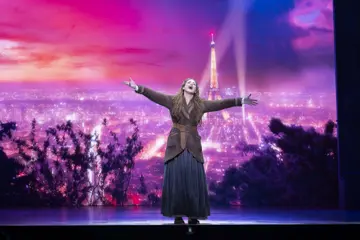Ahhhh, MIFF. The sights and sounds. The slow wssshhhhh of the Russell Street seats, as you sink your way into their vinyl discomfort. The unending queues, snaking down disreputable alleyways. The overheard pretentious conversations thereof: “a more accurate translation of the title would be...”; “I was just in Chile...”; “Baz is a good friend of mine…” etc. The all-consuming, bone-aching, teeth-chattering cold. And those blessed —if only ever momentary— victories of cinema; in which the sights and sounds of the surrounds recede, and cinema itself triumphs.
As the film festival progresses, your old bean Film Carew will be punching in twice-weekly updates from amidst the chaos, confusion, and queues, with reviews of everything I've seen on a day-by-day basis, for those interlopin' through the fest or locked into the daily grind.
Tuesday 7 August
The Ambassador (6.30pm, ACMI 2): The Red Chapel was the standout film from MIFF 2010; Mads Brügger's pitch-perfect sustained farce one of those rare documentaries whose narrative —a troupe of Danish-Korean comedians go on cultural exchange to North Korea— gives rise to its themes; the film a study of truth, pantomime, performance, and suppressing individual desires in the face of a greater pursuit (be it a pranking documentary or a totalitarian state). The Ambassador is nowhere nears as good; and feels, at times, forced; or, even worse, like its following a formula; this the Brüno to the past Borat. Brügger cuts closer to Baron Cohen terrain, here, using any means necessary —bluster, bribes, blackmail— to buy his way into the blood diamond trade, in service of a film whose monkeyshines are in service of a conflicted message.
Bonsái (4pm, Forum): Another strong work from the blessed New Latin American Cinema sub-section (perhaps, this year, MIFF's best curatorial program within), this deadpan bildungsroman matches its affable air of emotionally-withdrawn characters to a contrasting colour of casual carnality; this, in turn, evoking a work whose bisected then/now narratives chronicle a life lived in thrall to literate, and the writer authoring the world around them as they see fit.
Don't miss a beat with our FREE daily newsletter
Boy Meets Girl (1.30pm, Forum): Leos Carax's debut feature —made when he was all of 23— introduced an auteur fully-formed; a wild visionary armed with an eye for dizzying composition and symbolic imagery. Narratively, well, that's another story; but the homage to the nouvelle vague does have that defiant sense of romanticism that would later become this Last Romantic's calling.
Crazy Horse (4pm, ACMI 2): Frederick Wiseman's long, obsessive career has been a singular study; the direct-cinema don mining a solitary niche —observationist portraits of institutions at function—for 50 years and nearly as many features. Where his work can be —as mental hospitals and domestic violence shelters dictate— oft ascetic, Crazy Horse is brightly-coloured bubblegum; the 82-year-old courting raincoaters as he rolls cameras on naked burlesque babes backstage.
L (6.30pm, GU 4): Though it lacks the sure cinematic command of the works of countryman Yorgos Lanthimos —to whom Babis Makridis will be eternally compared— those no doubting the balls-out devotion to symbolism in this obtuse, inscrutable, insane piece of Greek Weird Wave provocation.
Miss Bala (9pm, GU 3): A defiant highlight in the cinematic year so far, Gerardo Naranjo's mighty motion-picture is 'action thriller' by category card, towering work-of-art in execution. It follows an aspiring beauty queen from the fringes whose trip into Tijuana's dark heart turns her from figure of individualism and agency into a chess piece in a drug-scarred turf-war; Naranjo's claustrophobic camera-work trapping the audience hostage, in turn.
Moonrise Kingdom (6.30pm, Forum): Pretty much the first sessions to sell out at MIFF were the screenings of Wes Anderson's latest, and best, film; the cult of Anderson fandom have slowly grown since Rushmore was screening semi-anonymously —at, fate-returning, Russell Street— all those years ago. Moonrise Kingdom's meticulous art direction, deadpan humour, and sense of defiant romanticism all speak perfectly of the auteur's aesthetic; and mark, in so many ways, the culmination thereof.
Shock Head Soul (9pm, GU 4): Simon Pummell's odd picture is part autobiography adaptation, part flight into fantasy, part talking-heads documentary, part theatre piece, part art installation; in which the life of fin de siècle English judge experiences a swift demise into schizophrenia and comes out the other side as either seer or loon. The judge is, then, judged by society; become a landmark case study in the budding realms of psychology and psychoanalytics; and, years on, a vivid historical curio.
¡Vivan Las Antipodas! (6.30pm, GU 5): Those who use the MIFF passport as veritable passport for cinematic tourism will find many a handsomely-photographed landscape to savour in this portrait of true geographical antipodes; Victor Kossakovsky mounting twin portraits —between, say, heaving Shanghai and empty Entre Ríos— that survey both radical differences and shared humanity.
Warriors Of The Rainbow – Seediq Bale: Parts 1 & 2 (6pm/9pm, Kino): This utterly unending nearly-six-hour two-parter reminds me of the work of tedious hack Ed Zwick: a long-ago historical conflict hijacked to shitty dramatic ends; this an occupationist war epic of early-20th-century Taiwan filled with convenient dramatic devices, noble savages and their mystical ways, swelling string music, crane shots pulling away from the battlefield to show how many people have died.
When A City Falls (4pm, Kino): There's both past and present tense in the title to Gerard Smyth's profound people's portrait of the Christchurch earthquakes; a study of history lived in-the-moment as the filmmaker wanders through the rubble, talking to those who've survived in the face of environment tumult and social structures in (both literal and figurative) collapse.
Wuthering Heights (6.30pm, GU 3): It's funny reading the online, by-the-pundits 'reviews' of Wuthering Heights from England, where Andrea Arnold's profane take on a classic institution has enraged the kind of people who write user comments. But, where history is filled with drawing-room adaptations of classic-lit handled with kid gloves and cotton-wool —and this is, apparently, what people want— Arnold drags Emily Brönte's on-the-syllabus tale of star-cross'd lovers into a realm of stark, savage realism; throwing away all her winsome words and letting the tenor of the tale be set by the howling gales blowing across those wiley, windy moors.
Wednesday 8 August
Falkenberg Farewell (11am, Forum): As a crew of small-town Swedish stoners idle away the last days of summer, they feel like the dying days for their group; friendships drifting apart, individuals drifting away from life, innocence verily on its deathbed.
Gainsbourg By Gainsbourg: An Intimate Self-Portrait/Souvenirs Of Serge(9pm, GU 3): Gainsbourg By Gainsbourg's claims of being a Self-Portrait are amusingly delusional; it hard to paint much in the way of a portrait when you're two decades dead. But there's plenty of the subject's candid conversations cut-up amidst an armada of archival footage; there at least the solace to be taken that this isn't yet another rock biopic filled with Bono, Henry Rollins, Thurston Moore et al. It's also happy to show Gainsbourg's final days as sad, pathetic, and drunk; which at least matches the candour of the subject with an air of truth. Souvenirs Of Serge is so intimate as if to border on voyeurism; Jane Birkin leading us through a collection of super-8 family home-movies (meaning: endless footage of Charlotte as a child) that, in their flickering silences and washed-out nostalgia, carry with it the sad weight of time passing.
King Of Pigs (9pm, Kino): Is King Of Pigs a profound portrait of a hateful society, its rampant misogyny, and tedious tendency towards masculine 'cool' and repellent violence? Or is it just a hateful, misogynist, tedious, repellent, unendingly violent picture? Given the very dopey quality of the writing and the embarrassing twist ending, I'm guessing it's more the latter; this a very real contender for the festival's worst film.
Monsieur Lazhar (6.30pm, Forum): In Philippe Falardeau's vision of the teaching profession, dysfunctional bureaucracy undoes the individual's ability to instruct, to enlighten, to console, to counsel; to, in short, teach. His titular character is the Algerian immigrant able to exist outside the system; his sense of respectful candour in classroom communication helping scarred children cope with collective grief and complicit guilt.
A Respectable Family (6.30pm, GU 3): The cultural notion of 'family honour' in fundamentalist Islamic society is explored, in provocative fashion, by Massoud Bakhshi's family saga; in which an ex-pat intellectual retruns to his rural hometown to take a teaching post, and finds himself ensnared in the veritable gossipry of petty bureaucracy. At the same time, his return stirs up childhood memoires of the Iran-Iraq war, and his fraught familial relationships become an oppressive burden.
Side By Side (4.30pm, Kino): Side by side: who's a bigger dick? David Fincher or Christopher Nolan? Amongst a plethora of swingin'-dick talking-heads tossing over the central 'celluloid vs digital' debate; those two kings of the multiplex take the most staunch stands on the issue; smirking and condescending as they detail the very correctness of their stances. Also, it should be noted: in this busily-edited, televisual parade of snappy soundbytes and Movie Memories™, the interviewer soliciting subjects is, um, Keanu Reeves.
The Wild Ones (9pm, GU 5): A descent-into-lawlessness becomes a descent-into-wilderness in Alejandro Fadel's symbolist picture; in which a gang of delinquent youths, on the lam from a robbery-gone-band, descend ever-further towards survivalist animalism in the vast Argentine landscape.
Thursday 9 August
Almayer's Folly (4pm, Forum): Joseph Conrad's Heart Of Darkness dwells at the heart of many of cinema's most revered descents, but here Belgian titan Chantal Akerman takes to his first novel; again finding another colonialist descent into an unforgiving landscape. Of course, the moments where Akerman hews t'wards the source text are the least interesting bits of Almayer's Folly; instead, the scenes where she imposes stilled, formalist minimalism on the soap-opera are arresting and beautiful; a shot where an illuminated boat slowly draws towards the camera is a singular image of unending magic.
The Ambassador (9pm, GU 5): See above.
How To Survive A Plague (9pm, Forum): Spanning a decade in the counter-cultural insurgency of AIDS activism, David France's epic documentary is blessed with an astonishing cache of archival footage that brings an era back to life. The film is both the definitive screen portrait of AIDS in America, and a more symbolic study in revolutionary political groups; in both their power-seizing glories and petty, self-destructive splinterings.
Love Story (9pm, GU 3): In the era of the 'questionably true' documentary —think: Banksy's pranksterism in Exit Through The Gift Shop or the staged dramas of Catfish— New Zealand iconoclast Florian Habicht shows an interesting disinterest for delineations between fiction and 'reality'. Staying in New York, he explores the city's cinematic portrayals of love by staging his own love story, soliciting advice for passersby on the street, and then hoping the acted-out fantasy becomes his own reality.
The Student (4pm, ACMI 2): Santiago Mitre's insider study in the backroom machinations and ever-shifting allegiances of internal university politics comes armed with an armada of words; his characters endlessly talking, political texts spoken aloud. In a grander sense, the film is about Argentine political history, and how the conflicts of the past play out, again and again, amongst new political ideologues, but it's also a personal story of the university experience; and the casual sex, life-razing crushes, personal evolutions, and endless parties of one's early 20s.
That Summer (4pm, ACMI 2): There's a slightly embarrassing tinge to the latest flick from Philippe Garrel, a memory-of-that-one-summer tale that would've, perhaps, played better if he'd actually just set the thing in the '60s. Instead, it's a modern dale of regressive values; a portrait of 'artistic' European youths summering in Rome; with men as artists, women as muses, monogamy the topic of discussion, and even films (plural) within the films. The presence of the maker's son, Louis, and mythically-curvaceous Italian siren Monica Bellucci give the film some added allure, but it's pretty dramatically dire, and very light on inspiration.
Two Years At Sea (6.30pm, GU 4): Lovers of film —of actual celluloid, of stock and grain and chemical processing and dust— will be thrilled by Ben Rivers debut, which was shot on 16mm black-and-white stock that he hand-cranked and processed in his sink. The graininess and haziness of the film create an evocative old-world atmosphere, with the wordless, long-take narrative and fondness for crackling ethnomusicological 78s painting a piece of isolationist cinema in pleasingly-archaic shades.

















